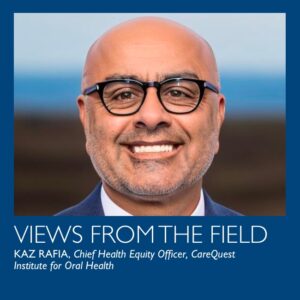Kaz Rafia, Chief Health Equity Officer, CareQuest Institute for Oral Health
The Americans with Disabilities Act (ADA), enacted on July 26, 1990, stands as one of the most significant civil rights laws in U.S. history. Designed to eliminate discrimination and ensure equal opportunities for Americans with disabilities, the ADA has had a profound impact on advancing health equity in various domains, including oral health. The ADA has been a transformative force in advancing health equity for Americans with disabilities by championing their rights to accessible health care services. Under Title II of the ADA, state and local governments, including public healthcare institutions, are mandated to offer equal access and reasonable accommodations to individuals with disabilities. This ensures that medical facilities, including dental offices, are equipped to cater to diverse patient needs, fostering an environment where disabled individuals can receive oral health services with dignity and equality.
Moreover, the ADA’s influence extends beyond physical accessibility. It has also propelled the integration of universal design principles, ensuring that health care spaces are inclusive and accommodating to people with disabilities. Dental offices now incorporate features like wheelchair ramps, wider doors, and adjustable examination chairs, all aimed at enhancing the accessibility of oral health care for individuals with mobility impairments.
Despite the monumental progress achieved through the ADA, individuals with disabilities continue to face significant challenges in accessing optimal oral health care. According to the National Council on Disability’s April 2023 report, poor oral health outcomes are a result of several systemic barriers: “(1) the insufficient number of [oral health care] providers rendering care … (2) the lack of government policies that support dental benefits … and (3) the insufficient funding to support essential [oral health care] services” for people with disabilities.
Research by CareQuest Institute for Oral Health has revealed that individuals with disabilities visit the dentist less often, are more frequently denied health care or oral health care due to discrimination, and visit the emergency department for dental care or pain three times more often compared to households and individuals not experiencing disabilities. A 2021 study highlighted that individuals with disabilities exhibit higher rates of oral health problems, such as dental caries and periodontal diseases when compared to the general population. This report also emphasized the challenges in accessing preventive care, a crucial aspect contributing to the disparities in oral health outcomes for this group. Data from the Centers for Medicare & Medicaid Services (CMS) further support these findings, indicating that people with disabilities are less likely to receive regular dental check-ups, resulting in untreated oral health issues and the need for more extensive dental interventions in the long term.
By acknowledging the remaining challenges and building upon the ADA’s foundation, we can work collectively to achieve a more accessible, equitable, and integrated oral health care system that uplifts the well-being and dignity of all Americans. To that end, and as part of CareQuest Institute’s philanthropic strategy, we are continuously and actively developing grantmaking opportunities that shed light on disparities and develop solutions rooted in communities. Through the Disability Inclusion and Justice in Oral Health Request for Proposals (RFP), CareQuest Institute is seeking to fund projects and partner with organizations that are working to address systemic barriers to oral health for people with disabilities and awarding $1.25M total—10 grants of $125,000 each. CareQuest Institute will prioritize proposals that reflect an authentic commitment to meaningfully and consistently engaging members of the disability community beyond treatment, and focus on upstream drivers, community empowerment, and justice. Proposals are due August 31, 2023.
This doesn’t just end with us. The philanthropic community can contribute significantly to addressing oral health care inaccessibility for individuals with disabilities. By funding initiatives that increase specialized oral health care providers, advocating for inclusive government policies, supporting research projects, and partnering with disability advocacy groups, philanthropic organizations can help bridge the workforce gap, promote equitable dental-based solutions, and elevate community voice in decision-making. By working together, the philanthropy field can drive positive change and work towards a more accessible and inclusive oral health care system for all Americans.
As we celebrate the anniversary of the ADA, it is essential to acknowledge its profound impact in advancing health equity for Americans with disabilities, including progress in oral health care accessibility. We must also recognize the need to remain vigilant and empower the very communities impacted by persistent disparities—and are confident that grants like this one can generate new momentum towards health equity in this space, built upon the foundation of past civil rights progress.

